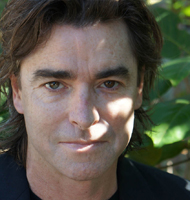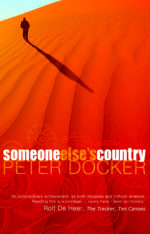INTERVIEW: Author Peter Docker discusses Someone Else’s Country and his Mickelberg play

I was born into a community whose preferred method of living with Aboriginal people was apartheid.
The country towns were, and still are, a hotbed of a nasty form of racism. Perhaps it is because out there everyone knows inherently the fairy tale version of history, where the first Australians were somehow divested of all of their wealth and land with no violence, is a total fabrication.
In fact, for many whites it is like the war is still going. And because of my belief that Australians are inherently good people who genuinely believe in community values, this set up a great conflict inside of me. How could this happen? How could, for example, West Australians freeze the Nyoongar people out of our economic, education, and social systems for 150 years, and then blame Nyoongar People for the wretched state in which they find themselves?
And really, I wanted to write about how much joy and fun and belonging that I have experienced inside the other country within our country, which is Aboriginal Australia.
When Someone Else’s Country first came out I was quite nervous about how it would be received in Indigenous circles.
I had unwittingly chronicled a kind of secret history that never sees the light of day outside of certain, closed circles. Overwhelmingly the response has been incredibly positive. The reaction from white Australia was quite a different thing. I was accused in the West Australian press of being a liar, and an exaggerator. I have lost most of my white friends, and all of my extended blood family, which was unexpected, and on a personal level, fairly tough to deal with.
Unfortunately, I don’t think much has changed for Indigenous people. This is because the fundamental shift that needs to happen in this country has not happened and, as yet, is on no-one’s agenda. The dominant white culture wants the Aboriginal people to change to be more like us. This has been tried since the arrival of the first settlers, and even though it takes many forms, it is all about assimilation. There is another way.
White Australia needs to become ‘blacker’. We need to educate ourselves. We need to understand Aboriginal Law better. We need to learn about the relationship between country and story. We need to learn Aboriginal Languages so we can pay proper respect. There is vast ecological knowledge in this country – perhaps even the answers to the world’s burgeoning environmental disaster – but this knowledge is not in the English language.
I always wanted to be a writer, but somehow fell into performing because of the intoxicating rush and immediacy of the relationship with the audience. I think being a performer makes me more attuned to the drama and the urgency of any situation. Also, I play the scenes out in my head, and sometimes out loud (doing all the voices) as I am writing them. I have to really love a subject to write about it. I have to be obsessive.
After this book Someone Else’s Country was published, I was approached by Ray and Peter Mickelberg, who wanted me to write a play about their experiences with the justice system.
I was immediately interested because I greatly admired these men who stood up at the Royal Commission into Aboriginal Deaths In Custody and gave evidence about a young Aboriginal prisoner whose murder by the prison guards they had witnessed, in spite of massive pressure (death threats) brought to bear on them by the authorities.
The outcome is an explosive play which goes to the heart of corruption in the Police Force and the Judiciary of WA.
Many West Australians who for years have swallowed the smear campaign run on them by certain sections of the media will be quite shocked by what they see. This is a seminal West Australian story – two innocent men sent to jail for a crime that they did not commit – who simply refuse to lay down. Two innocent men, one a returned soldier who gave his all for his country on the battle fields of Vietnam, who suddenly find themselves in one of the most brutal prisons in the Western world, where living conditions for the inmates are unchanged since the 1850s.
The play will be produced in Fremantle by Deckchair Theatre Company August, September 2010.



